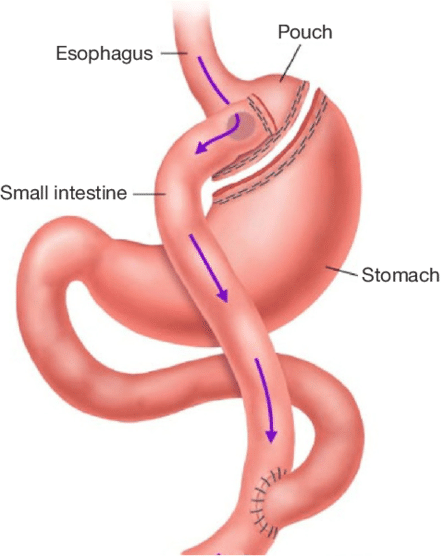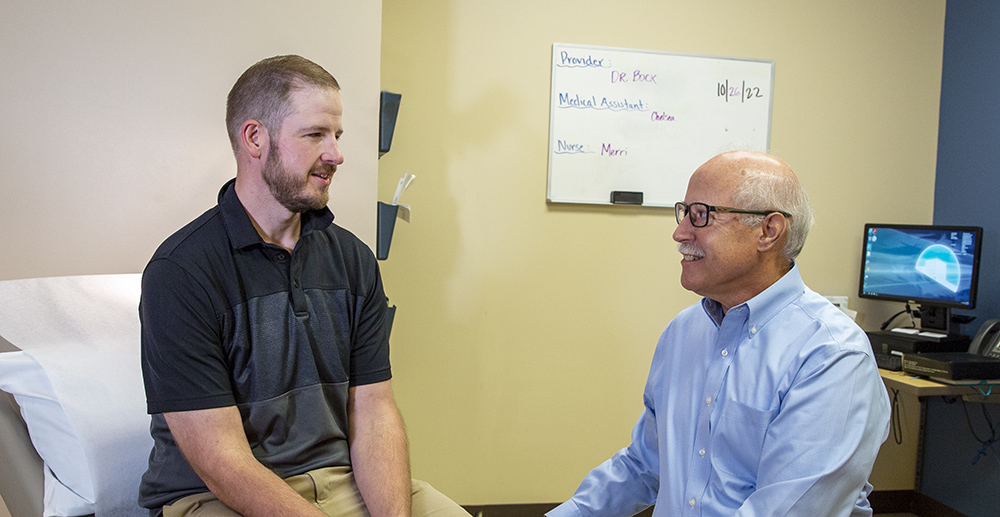Gastric Bypass Surgery
Gastric bypass surgery is the gold standard weight loss surgical procedure. On average, most patients lose 70% - 80% of their extra weight.
Gastric bypass surgery will help you lose weight by:
- Making you feel full and satisfied
- Changing the way your brain senses hunger
- Making it uncomfortable to eat foods high in fat and sugar

Success is Better Health, Not Just Weight Loss
If you exercise and eat a healthy diet after surgery, the changes can be dramatic. Gastric bypass (Roux-en-Y surgery) is very successful for improving diabetes. Some patients who have been diabetic can stop taking their diabetic pills and insulin before they leave the hospital. Others will likely be able to reduce their insulin dose dramatically.
As you lose weight, other health problems such as sleep apnea, high blood pressure, reflux (heartburn) and arthritis will get better over time.
Paying for Weight Loss Surgery
Weight loss surgery is an investment in your long-term health. Contact Patient Financial Services to make a payment plan today.
How Gastric Bypass Helps with Weight Loss
After your surgery, a small meal will feel like a very large meal because the small pouch can’t hold a lot of food. When you eat, the walls of your stomach stretch and your body sends a message to your brain that you’re full.
Over time, if you eat healthy foods, your body and brain will feel hunger differently. The hormone ghrelin in your stomach controls appetite in your brain. Gastric bypass surgery reduces the amount of ghrelin your body makes. Your brain will tell you to eat smaller, healthier amounts of food.
Remember, the surgery will help, but you must make lasting changes to your food and exercise habits to lose weight and keep it off. This program gives you the tools to improve your health. We will encourage you to be successful.
FAQs About Gastric Bypass Surgery
When you swallow food, it will go into the small upper pouch of the stomach. This pouch holds only about one ounce of liquid or two to three small bites of food at a time. From the upper pouch the food passes through the half-inch opening (anastomosis) into the upper small intestine (jejunum).
Before surgery, your stomach broke up food so it could be digested. The new small pouch in your stomach will not do this. Instead, your small intestine will digest the food using enzymes (proteins) that are made by your other organs (the lower stomach, pancreas, and liver). Even though your body will absorb food normally, it may not absorb some vitamins and extended-release medicines (medicines that release into your body over time) normally.
For the first two weeks after surgery, you can only eat pureed food (liquified in a blender). After two weeks you can eat soft solid foods. Most patients can eat regular foods after one month. You must chew your food well before swallowing so it will pass easily into the small intestine.
Right after surgery, you will need to drink protein shakes that are low in fat and carbohydrates until you can eat enough solid protein. In the long term, you will need to avoid high calorie liquids because the surgery changes how your body digests sugary, fatty substances.
Before surgery, foods such as juice, milk shakes and cake were processed by the stomach before they entered the intestine. After surgery, food goes directly into the intestine, which can't process the fat and sugar.
This is called dumping. It can lead to feeling feel weak and sweaty. Dumping can cause diarrhea and a faster heart rate. Simply put, avoid foods that are high in sugar and fat after gastric bypass surgery.
The staples might leak: The surgeon will use staples on your stomach. A leak in the line of staples or one of the connections is a rare but serious problem that can happen in the first two weeks after surgery. If it does, you may need more surgery.
Your intestines might get blocked: During surgery, the surgeon cuts and reconnects your intestine. This forms open spaces behind the new connections. These spaces are closed during surgery, but if any open up over time, the intestine can move into the spaces and become blocked. This is rare and can happen years after surgery.
Bands of fibrous scar tissue called adhesions can form that can block your intestine. This may happen years after the surgery, and it can happen with any type of abdominal surgery.
Narrowing: The place where the stomach and intestine meet might become narrow, causing ulcers. This happens most often to patients who start smoking again or take anti-inflammatory drugs such as ibuprofen.
You could have low levels of some vitamins: All patients who have gastric bypass surgery need to take a multivitamin, vitamin B12 and calcium citrate. Some patients also need an iron supplement. If you don’t take these supplements, you’ll be more likely to have vitamin deficiency.
If you adopt lifelong good habits in the first two years after surgery, you probably won’t regain much weight. At five to 10 years after surgery, patients have usually kept off 67% of their extra weight.
Studies have shown that between years two and six after surgery, patients may gain back 20% of the weight they have lost. If you continue appropriate eating habits, this weight gain may not occur. Studies have also shown that only 1% to 2% of patients gain back all the weight.
Your weight loss will be fastest in the first six months after surgery. After that, your weight loss will slow down. Two years after surgery, you might gain back some weight. The amount of weight you gain is different for every person. You might not gain any or you might gain all your weight back, but this is rare.
If you go back to bad habits, you’re more likely to regain some weight. Working closely with your health care team after surgery will help you continue to move toward your goals.
Your Weight Loss Surgery Partner
Explore all your weight loss surgery options at UNM Health and meet our surgical team.

